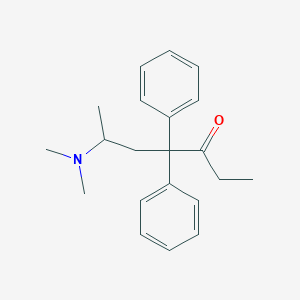| 1 |
ClinicalTrials.gov (NCT00838981) Pharmacotherapy & CM for Opioid and Cocaine Dependence
|
| 2 |
Methadone FDA Label
|
| 3 |
Drugs@FDA. U.S. Food and Drug Administration. U.S. Department of Health & Human Services. 2015
|
| 4 |
Modafinil FDA Label
|
| 5 |
ClinicalTrials.gov (NCT01965925) Targeting Circadian and Cognitive Dysfunction in Bipolar Disorder With Modafinil. U.S. National Institutes of Health.
|
| 6 |
The ChEMBL database in 2017. Nucleic Acids Res. 2017 Jan 4;45(D1):D945-D954.
|
| 7 |
Methadone treatment and its dangers. Medicina (Kaunas). 2009;45(5):419-25.
|
| 8 |
In vitro P-glycoprotein-mediated transport of (R)-, (S)-, (R,S)-methadone, LAAM and their main metabolites. Pharmacology. 2007;80(4):304-11.
|
| 9 |
Methadone metabolism and drug-drug interactions: in vitro and in vivo literature review. J Pharm Sci. 2018 Dec;107(12):2983-2991.
|
| 10 |
Bidirectional transfer of methadone across human placenta. Biochem Pharmacol. 2005 Jan 1;69(1):187-97.
|
| 11 |
Methadone--metabolism, pharmacokinetics and interactions. Pharmacol Res. 2004 Dec;50(6):551-9.
|
| 12 |
Involvement of cytochrome P450 3A4 enzyme in the N-demethylation of methadone in human liver microsomes. Chem Res Toxicol. 1996 Mar;9(2):365-73.
|
| 13 |
Expression, purification, and characterization of mouse CYP2d22. Drug Metab Dispos. 2006 Jul;34(7):1167-74.
|
| 14 |
Comparative effects of drugs on P-glycoprotein expression and activity using rat and human trophoblast models. Toxicol In Vitro. 2010 Mar;24(2):630-7. doi: 10.1016/j.tiv.2009.10.005. Epub 2009 Oct 17.
|
| 15 |
Possible involvement of toll-like receptor 4/myeloid differentiation factor-2 activity of opioid inactive isomers causes spinal proinflammation and related behavioral consequences. Neuroscience. 2010 May 19;167(3):880-93. doi: 10.1016/j.neuroscience.2010.02.011. Epub 2010 Feb 21.
|
| 16 |
opioid receptor agonist-selective regulation of interleukin-4 in T lymphocytes. J Neuroimmunol. 2013 Oct 15;263(1-2):35-42. doi: 10.1016/j.jneuroim.2013.07.012. Epub 2013 Jul 25.
|
| 17 |
Galactorrhoea may be associated with methadone use. BMJ. 2006 May 6;332(7549):1071. doi: 10.1136/bmj.332.7549.1071.
|
| 18 |
Psychoneuroendocrine effects of methadone maintenance. Psychoneuroendocrinology. 1989;14(5):371-91. doi: 10.1016/0306-4530(89)90007-3.
|
| 19 |
Binding of disopyramide, methadone, dipyridamole, chlorpromazine, lignocaine and progesterone to the two main genetic variants of human alpha 1-acid glycoprotein: evidence for drug-binding differences between the variants and for the presence of two separate drug-binding sites on alpha 1-acid glycoprotein. Pharmacogenetics. 1996 Oct;6(5):403-15. doi: 10.1097/00008571-199610000-00004.
|
| 20 |
Mechanisms of the inhibition of nuclear factor-B by morphine in neuronal cells. Mol Pharmacol. 2012 Apr;81(4):587-97. doi: 10.1124/mol.111.076620. Epub 2012 Jan 18.
|
| 21 |
Adipocyte-derived hormones in heroin addicts: the influence of methadone maintenance treatment. Physiol Res. 2005;54(1):73-78. doi: 10.33549/physiolres.930568.
|
| 22 |
Methadone induces necrotic-like cell death in SH-SY5Y cells by an impairment of mitochondrial ATP synthesis. Biochim Biophys Acta. 2010 Nov;1802(11):1036-47. doi: 10.1016/j.bbadis.2010.07.024. Epub 2010 Aug 3.
|
| 23 |
QTc interval prolongation associated with intravenous methadone. Pain. 2003 Oct;105(3):499-506. doi: 10.1016/S0304-3959(03)00205-7.
|
| 24 |
Drugs@FDA. U.S. Food and Drug Administration. U.S. Department of Health & Human Services.
|
| 25 |
Summary of information on human CYP enzymes: human P450 metabolism data. Drug Metab Rev. 2002 Feb-May;34(1-2):83-448.
|
| 26 |
Effects of modafinil on the sleep EEG depend on Val158Met genotype of COMT. Sleep. 2010 Aug;33(8):1027-35. doi: 10.1093/sleep/33.8.1027.
|
| 27 |
Dopaminergic role in regulating neurophysiological markers of sleep homeostasis in humans. J Neurosci. 2014 Jan 8;34(2):566-73. doi: 10.1523/JNEUROSCI.4128-13.2014.
|
|
|
|
|
|
|


